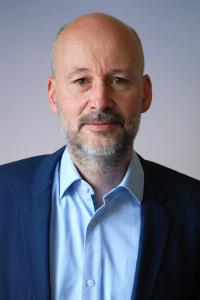Robert F. Schwabe, MD
- Professor of Medicine

Overview
Dr. Robert Schwabe is a Professor of Medicine and serves as the Director of the Digestive and Liver Disease Research Center at Columbia University. His research focuses on the role of hepatic stellate cells in maintaining liver homeostasis and the progression of metabolic-associated steatotic liver disease (MASLD), while developing novel therapeutic strategies for liver fibrosis and liver cancer. He also leads the NIH-funded Columbia University Digestive and Liver Disease Research Center, which aims to deepen the understanding of liver disease mechanisms and advance treatment options.
Dr. Schwabe’s lab is dedicated to examining how chronic liver injury triggers wound-healing responses that contribute to fibrosis and cancer development. His research postulates that short-term beneficial wound-healing processes like inflammation can drive long-term pathological outcomes, including liver fibrosis and carcinogenesis. The lab focuses on key areas such as the role of the gut microbiota and inflammatory pathways in liver disease, the activation of hepatic stellate cells during liver injury, and the impact of endocannabinoids on liver pathology. Additionally, the lab employs Bac recombineering technology to create novel genetic models that further study liver fibrosis, inflammation, and hepatocellular carcinoma.
Academic Appointments
- Professor of Medicine
Gender
- Male
Research
My research seeks to elucidate mechanisms by which fibrosis and cancer develop in the chronically injured liver using mouse models, patient samples as well as novel Systems Biology approaches. To understand the contribution of liver fibroblasts and the underlying pathways, my lab has generated hepatic stellate cell-selective Cre transgenic mouse (LratCre), allowing to trace and functionally manipulate hepatic stellate cell (HSC)-derived fibroblasts. Current efforts are to delineate the contribution of HSC to different types of injury and fibrosis, including non-alcoholic steatohepatitis (NASH), with the ultimate goal to identify novel druggable pathways that promote HSC activation and liver fibrosis. Besides fibrosis, my lab also investigates liver cancer development. Liver cancer is the second leading cause of cancer mortality world- wide, and almost never develops in healthy livers. In most patients, liver cancer develops after decades of chronic liver injury, inflammation and fibrosis, supporting the notion that liver cancer is “a wound that does not heal”. One interest of my laboratory is to unravel the relationship between fibrosis and cancer development. Using mouse models, we try to understand whether fibroblasts and ECM promote the development of hepatocellular carcinoma (HCC) using LratCre mice to ablate or functionally manipulate cancer-associated fibroblasts (CAF) in liver carcinogenesis. In addition, my laboratory is interested in the role of fibrosis and CAF in the development of cholangiocarcinoma (CCA). Using above-described tools such as LratCre-transgenic mice, we seek to uncover how the absence or inactivation of stellate cell-derived CAF and ECM proteins affects CCA development. Key data are confirmed using bulk and single cell RNA-sequencing as well as novel Systems Biology approaches in patient samples. Finally, my lab seeks to uncover druggable "master regulators" in HCC and CCA using novel Systems Biology approaches in collaboration with the Califano lab.
Selected Publications
Saito, Y., Yin, D., Kubota, N., Wang, X., Filliol, A., Remotti, H., Nair, A., Fazlollahi, L., Hoshida, Y., Tabas, I., Wangensteen, K. J., & Schwabe, R. F. (2023). A Therapeutically Targetable TAZ-TEAD2 Pathway Drives the Growth of Hepatocellular Carcinoma via ANLN and KIF23. Gastroenterology, 164(7), 1279–1292. https://doi.org/10.1053/j.gastro.2023.02.043
Filliol, A., Saito, Y., Nair, A., Dapito, D. H., Yu, L. X., Ravichandra, A., Bhattacharjee, S., Affo, S., Fujiwara, N., Su, H., Sun, Q., Savage, T. M., Wilson-Kanamori, J. R., Caviglia, J. M., Chin, L., Chen, D., Wang, X., Caruso, S., Kang, J. K., Amin, A. D., … Schwabe, R. F. (2022). Opposing roles of hepatic stellate cell subpopulations in hepatocarcinogenesis. Nature, 610(7931), 356–365. https://doi.org/10.1038/s41586-022-05289-6
Affo, S., Nair, A., Brundu, F., Ravichandra, A., Bhattacharjee, S., Matsuda, M., Chin, L., Filliol, A., Wen, W., Song, X., Decker, A., Worley, J., Caviglia, J. M., Yu, L., Yin, D., Saito, Y., Savage, T., Wells, R. G., Mack, M., Zender, L., … Schwabe, R. F. (2021). Promotion of cholangiocarcinoma growth by diverse cancer-associated fibroblast subpopulations. Cancer cell, 39(6), 866–882.e11. https://doi.org/10.1016/j.ccell.2021.03.012
Bhattacharjee, S., Hamberger, F., Ravichandra, A., Miller, M., Nair, A., Affo, S., Filliol, A., Chin, L., Savage, T. M., Yin, D., Wirsik, N. M., Mehal, A., Arpaia, N., Seki, E., Mack, M., Zhu, D., Sims, P. A., Kalluri, R., Stanger, B. Z., Olive, K. P., … Schwabe, R. F. (2021). Tumor restriction by type I collagen opposes tumor-promoting effects of cancer-associated fibroblasts. The Journal of clinical investigation, 131(11), e146987. https://doi.org/10.1172/JCI146987
For a complete list of publications, please visit PubMed.gov